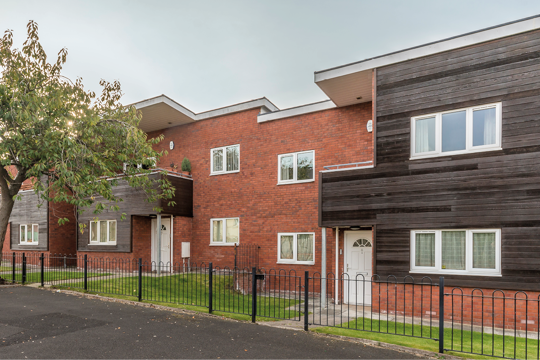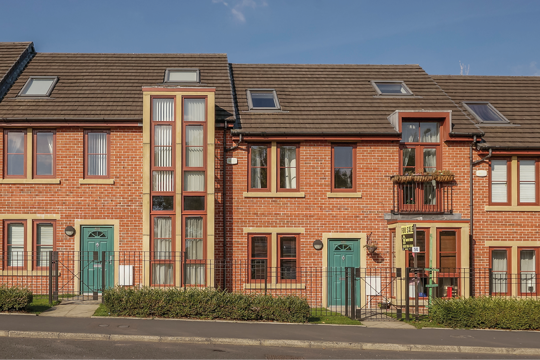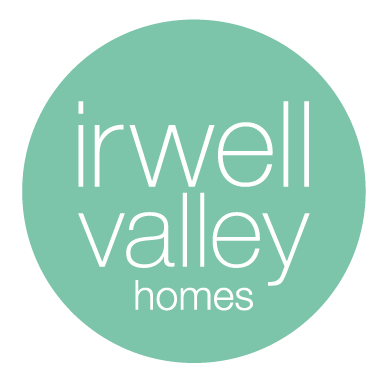
You can pass your tenancy on to another member of your family. This is called assigning a tenancy.
When you assign your tenancy, you will no longer be responsible for the home – this responsibility will be passed onto the new tenancy holder.
A tenancy can only be transferred by assignment once, and this is generally by either
- a transfer order under the Matrimonial Causes Act 1973,
- an exchange
- passing your tenancy to a qualifying family member after the current resident has passed away.
If you rent a home from us and are looking to assign your tenancy, contact your Neighbourhood Officer to discuss this - find out who yours is here.
To enquire about assignment in a leasehold property, please contact our leasehold team - you can find their details here.

If a family member has passed away and you are looking to take over their tenancy, we can help. We know this will be a difficult time and so we will support you through this.
A tenancy can only be passed on once by succession. The tenant's husband, wife, or partner has the first claim on the tenancy. If there is no husband, wife or partner, another family member might be able to take over the tenancy. This could include their:
• parent
• grandparent
• child (including stepchild)
• grandchild
• brother
• sister
• aunt
• uncle
• nephew
• niece
To take over the tenancy:
• You must have lived at the property for 12 months before the current tenant passed away.
• The property must have been the former tenants main or only home.
If we adapted the property for your loved one and you don't need the adaptations that we have installed, we may offer you another property that is more suitable for your needs.
This then helps us to let the home to someone who will benefit from these adaptations.
If the property is too large for you and you want a smaller home, we can discuss this with you.
For further help and support with tenancy succession, please contact your Neighbourhood Officer - find out yours here.
To enquire about the succession or assignment of a leasehold property, please contact our leasehold team - their details are here.

Customers who would like to move to another of our homes should ensure they are registered with the Choice Based Lettings system for the area(s) where they would like to live. You can find details of the different schemes here. Once registered and approved you can then bid on homes which meet your needs.
Alternatively, if your home is no longer suitable for you and you need to move to something that better meets your needs, you can apply for an internal housing transfer with us.
To apply for an internal transfer, you must
- have lived in your current home for 12 months or more
- hold an assured tenancy
- have not breached your tenancy
- be affected by over or under-occupancy of your home – either experiencing the financial burden of a house which is too big for your needs or living in overcrowded conditions (as defined by the relevant local authority’s definition of overcrowding).
Once on the transfer waiting list, we will help you to either
- move into another home that we own that better suits your needs, when it becomes available.
- swap homes with another Irwell Valley Homes customer who is also looking to move - where this helps both sides into a home which better meets their needs.
Please contact us to make a transfer application.
Bolton customers
If you live in Bolton and are affected by over or under occupancy you should apply for a new home via Homes For Bolton.
If you live in Bolton and need to be re-housed to meet medical needs, please contact us to discuss the process.
Urgent transfers
We will support customers into a new home when dealing with an emergency situation – such as when someone is fleeing violence or the threat of violence. This can also include a temporary move whilst major works are completed at their home.

Mutual Exchange (swapping homes)
A mutual exchange is a way for social housing residents to move house by swapping homes with another social housing customer. Mutual exchange can often help tenants to find alternative accommodation which better meets their needs more quickly.
Please ensure you and your family are eligible. Common reasons for mutual exchanges being refused include:
- You or the applicant you are exchanging with are in rent arrears
- Your home is adapted for a person with specific needs and nobody in the new household has specific needs.
- It would lead to overcrowding or significant under-occupancy.
- A member of your household has been involved in anti-social behaviour.
- You have a pet and are requesting to exchange into a property within a communal block.
- Other personal circumstances including affordability and – for new Irwell Valley Homes customers – suitable reference checks.
- We have started eviction proceedings and/or served you a Notice of Seeking Possession.
Please ensure you obtain the correct permissions from us and any other landlord to protect you against legal action, including eviction.
A mutual exchange has many implications. Please consider the following before applying:
- You could be giving up some tenancy rights including succession or right to buy.
- The condition of the property is accepted as seen. Irwell Valley Homes has no duty to upgrade any elements of the home. Improvements to things like kitchens, bathrooms and windows will be carried out according to pre-planned schedules.
- Garden maintenance (except communal areas) will become your responsibility.
- Adapted homes will remain in their current condition and will not be converted back.
- Any personal items left behind at a property will become your responsibility.
- Pets are not permitted in homes within a communal block.
- Certain home improvements you want to carry out may need to follow our Alterations Procedure.
We also encourage customers to budget for any costs related to moving to the new home – such as flooring or furnishing - as well as on-going bills – particularly if the property is larger and council tax or energy bills are set to increase.
Support networks from family and friends; access for school or work; and public transport links are other key considerations to take into account.
Before agreeing to a mutual exchange, please remember the following:
- The condition of the home is taken ‘as seen’ – you should ensure you are happy with it. Any alterations will remain, unless we have specified that something needs to be reverted to its original condition before the exchange can take place.
- Any outstanding repairs not covered by our Repairs Policy and not completed by the outgoing customer will become your responsibility. This includes any neglect or damage caused by them.
- Irwell Valley Homes is committed to building more homes to meet the growing need and development could be ongoing near to your new home or could take place there in the future.
- On receiving your application we will carry out the relevant eligibility checks and ask you to agree to the terms of the exchange. This may include a formal interview and affordability check. All applications will be considered carefully and decisions made in line with our procedure. We will notify you within 42 days of receiving your application if it has been approved or not. We will provide you with reasons if your application is not granted. Customers must only go ahead with an exchange once written permission from Irwell Valley Homes is received, and not before.
- We will then agree a date for one of our property inspectors and your Neighbourhood Officer to visit your home. Before this takes place, please ensure all outstanding repairs have been completed.
- We would expect the new tenant to also attend on this day – whether they are an Irwell Valley Homes customer or not. If they are, an inspection of their property will also be needed.
- Please help us with the inspection by ensuring that we have access to all areas of the home and can take photographs without obstructions.
- If during the inspection any outstanding repairs are highlighted, or there are any concerns with the property’s condition, a follow up visit will be arranged to allow for this work to be done in the meantime.
- We will allow up to two follow-up inspections. If the work required remains incomplete, the mutual exchange will be cancelled.
- Before a move date can be set, we need to complete an electrical compliance check on all relevant properties. If remedial works are needed this could result in a delay in the exchange being completed.
- If the exchange is approved, we’ll provide a date when the keys can be exchanged, and the relevant documents completed. We would expect customers to have vacated their outgoing home by midday. Please see further details about leaving your home below.
House Exchange - the national mutual exchange scheme
As well as helping customers to swap homes via our transfer waiting list, we are part of House Exchange - the national mutual exchange scheme.
This scheme helps housing association tenants to swap homes with housing association residents who are also looking to move house.
Register with House Exchange here.
Ending your tenancy
You can end your tenancy with us by completing the form available to download here and emailing it to us at contact@irwellvalley.co.uk. Alternatively, contact us to request a paper copy.
We will then arrange to visit you to discuss this. You will get a tenancy end date in writing. This will be calculated from the next available Monday at the point of receiving your notice.
During the notice period, we may contact you to arrange for a new customer to view the home. We really appreciate your help with this as it enables us to support someone who needs housing as quickly as possible.
Leaving the property
On the day your tenancy ends, please return all keys and leave the property in a clean and tidy condition by 10am.
Abandoned homes
If you leave your home without telling us, we will serve a Notice to Quit. If you don’t reply during the Notice to Quit period, we will assume the property has been abandoned.
We will accept this as surrender of your tenancy, which will then bring your tenancy to an end. This would then make you ineligible for housing with us in the future. It may also affect your chances of sourcing a home with another housing association.
If you leave without requesting to end your tenancy, we may charge you for the cost of all repairs that are needed. If you owe us money for rent or other charges when you leave you will need to pay this. For more information contact your Neighbourhood Officer here.
If you're going away for more than four weeks, please let us know. Without this, we may believe your property has been abandoned and take the necessary steps to recover it.
Tenancy fraud
Tenancy fraud can take several different forms. The key areas are:
- Subletting – renting the home to somebody else
- Unauthorised assignment (including mutual exchange) – giving the tenancy to another person without our permission.
- Wrongly claiming succession – taking over a tenancy by falsely claiming to have lived in the home for the relevant qualifying period, or by not being a relevant person entitled to succeed the tenancy.
- Right to acquire / Right to buy fraud – providing incorrect information to buy a home.
- Obtaining a tenancy through false statement – giving incorrect information, such as claiming to be homeless to gain a tenancy
All of the above could lead to someone losing their home and being prosecuted under the relevant legislation.
We work closely with our partners to investigate and tackle suspected tenancy fraud. We conduct tenancy audits and work with the National Anti-Fraud Network to carry out tenancy checks across all our homes to make sure the right people are still living there.
Please let us know if you suspect tenancy fraud
If you suspect somebody is committing tenancy fraud, please contact your Neighbourhood Officer.
